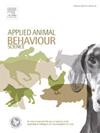“Decoding ambiguity”: Asian elephants’ (Elephas maximus) use previous experiences and sensory information to make decisions regarding ambiguity
IF 2.2
2区 农林科学
Q1 AGRICULTURE, DAIRY & ANIMAL SCIENCE
引用次数: 0
Abstract
Animals rely on sensory information from the environment to make optimal decisions. However, animals are often faced with incomplete or ambiguous information. Some species use sensory information and previous experiences to generate expectations about ambiguity. To test this, we used a cognitive bias test experimentally modified for Asian elephants (Elephas maximus) to investigate how they respond to ambiguous cues after positive (rewarded) and negative (unrewarded) experiences. We manipulated the degree of ambiguity by associating the spatial position and colour of the cues to either previously experienced positive or negative experiences. We demonstrate that elephants use previous experiences, and the valence (affective value) attached to those experiences to make decisions regarding ambiguity. Elephants show a positive bias by opening the ambiguous positive box three times as often and twice as quickly compared to the negative cue. Conversely, they are less likely to open and slower to respond to the ambiguous negative cue. These results are consistent with responses of farm animals and captive wild mammals when faced with unconditioned ambiguous cues with perceptual overlaps. Our findings indicate that when making decisions under ambiguity, animals rely on cognitive and sensory mechanisms. A greater understanding of decision-making mechanisms could aid in understanding animals' responses to their immediate environment with potential implications for conservation and welfare.
求助全文
约1分钟内获得全文
求助全文
来源期刊

Applied Animal Behaviour Science
农林科学-行为科学
CiteScore
4.40
自引率
21.70%
发文量
191
审稿时长
18.1 weeks
期刊介绍:
This journal publishes relevant information on the behaviour of domesticated and utilized animals.
Topics covered include:
-Behaviour of farm, zoo and laboratory animals in relation to animal management and welfare
-Behaviour of companion animals in relation to behavioural problems, for example, in relation to the training of dogs for different purposes, in relation to behavioural problems
-Studies of the behaviour of wild animals when these studies are relevant from an applied perspective, for example in relation to wildlife management, pest management or nature conservation
-Methodological studies within relevant fields
The principal subjects are farm, companion and laboratory animals, including, of course, poultry. The journal also deals with the following animal subjects:
-Those involved in any farming system, e.g. deer, rabbits and fur-bearing animals
-Those in ANY form of confinement, e.g. zoos, safari parks and other forms of display
-Feral animals, and any animal species which impinge on farming operations, e.g. as causes of loss or damage
-Species used for hunting, recreation etc. may also be considered as acceptable subjects in some instances
-Laboratory animals, if the material relates to their behavioural requirements
 求助内容:
求助内容: 应助结果提醒方式:
应助结果提醒方式:


